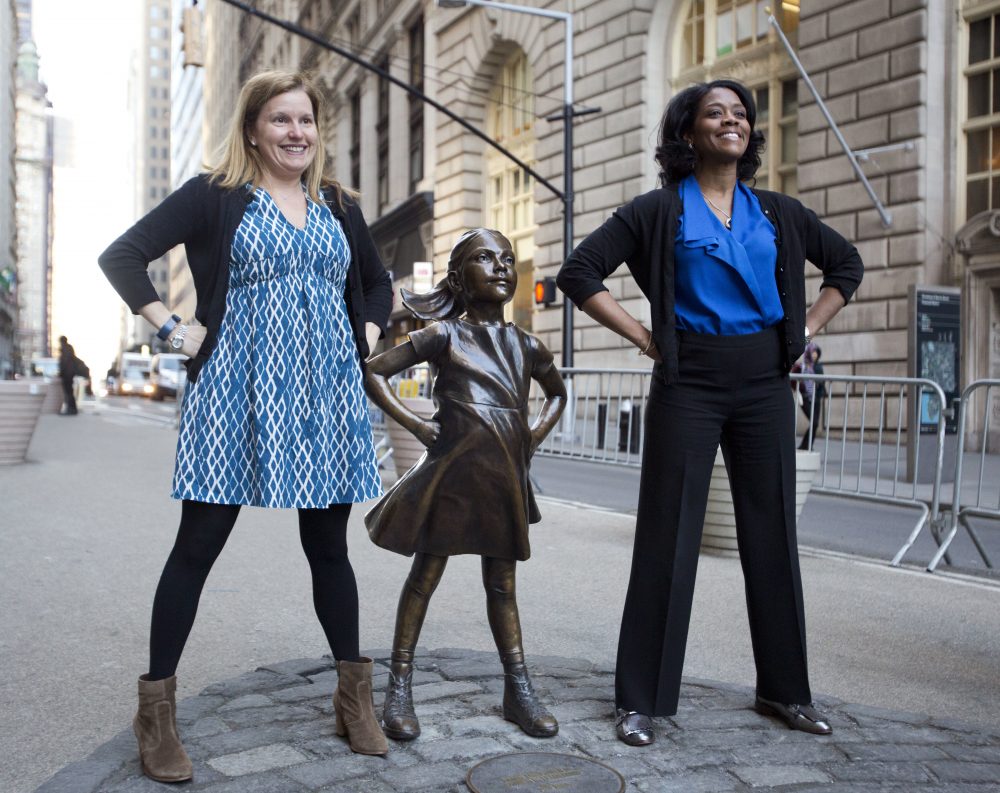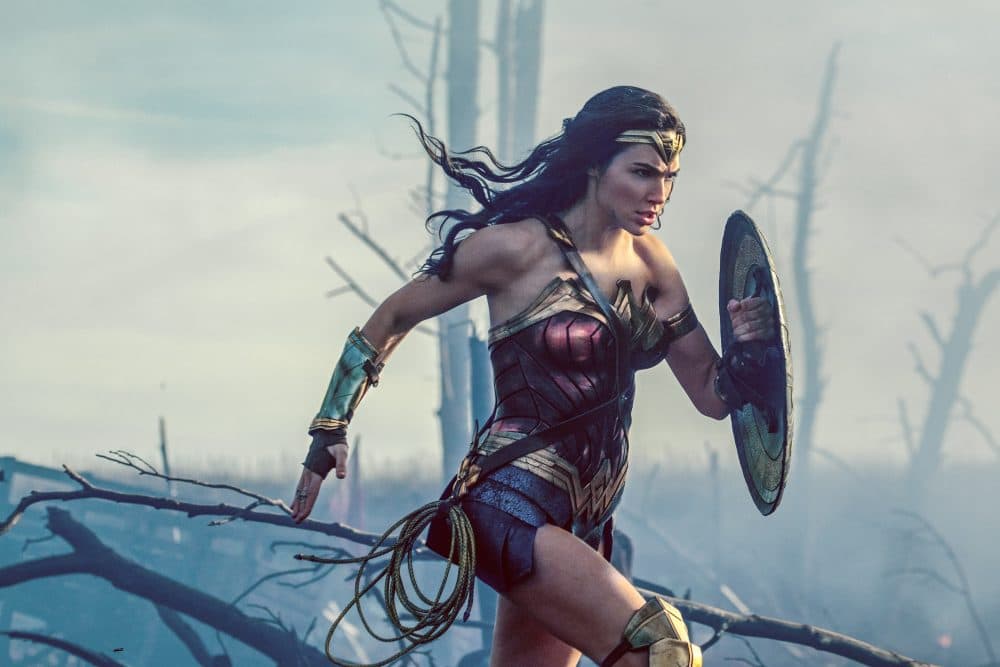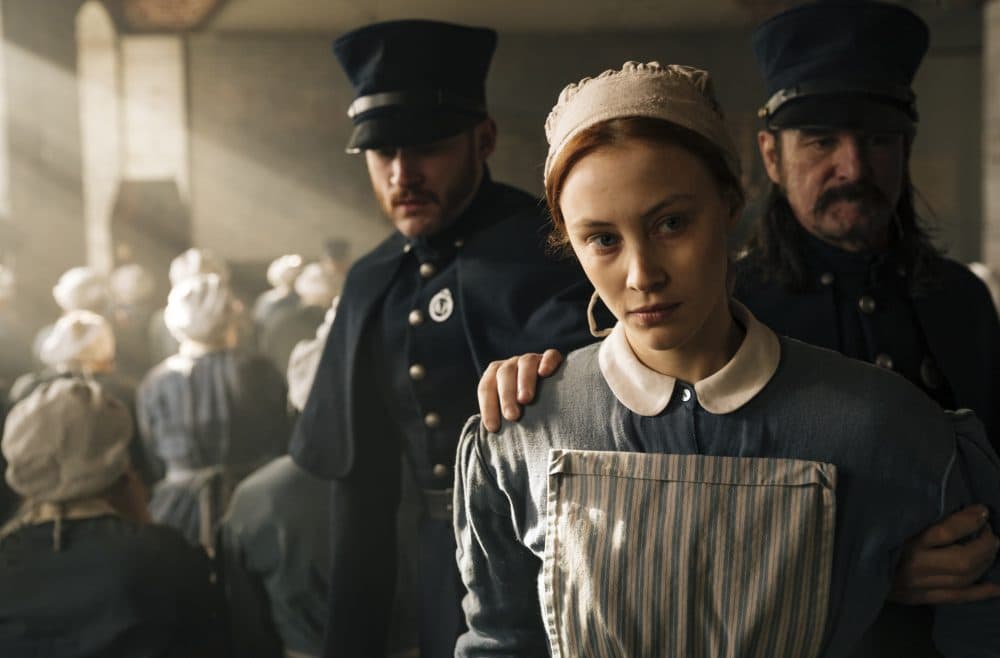Advertisement
Year In Arts And Culture
From 'Fearless Girl' And 'Wonder Woman' To #MeToo — No More Hidden Figures In 2017

This time we mean it. It’s been said in years past, but 2017 really was the year of the woman in arts and culture. And it would have been the year of the woman even without the resistance against sexual abusers and #MeToo.
In fact, I would argue that it was how women asserted themselves in arts and culture that led to #MeToo.

Consider that this was a year in which "Fearless Girl" faced down the bull of Wall Street and "Wonder Woman" became the superhero of the year as the boys — Superman, Batman and X-Men — grew increasingly tiresome and irrelevant. And you didn’t have to go to comic book adaptations to find superheroes. Technically it came out the last week of 2016 but “Hidden Figures,” the story of African-American female mathematicians whose work at NASA was not given the credit it deserved because of both their race and their gender, set the tone for what was to come.
It wasn't the only late 2016 arts or cultural event that foreshadowed 2017. The revolutionary “Westworld” ran on HBO from October to December. When it debuted, some viewers thought it was the ultimate objectification of women, having artificially intelligent robots programmed to fulfill male fantasies. By season’s end it was apparent that the AI women on the show were Wild West Wonder Women #MeTooers and there was going to be a heavy price to pay for those male fantasies.
They’re coming for you, Harvey Weinstein, Matt Lauer and Israel Horovitz.
But before folks break an arm patting themselves on the back for the progress symbolized by cultural developments, let’s consider what else happened at the end of the year. In November of 2016, while the left was taking the moral high ground on women’s and LGBTQ issues, the right gained control of the White House, Senate, House and Supreme Court.
While the artistic culture was going in one direction, the political culture had gone in another. And lest we forget, President Trump was elected with 53 percent of the white women’s vote.
Still, the takeaway from 2017 should be that it was the year that women not only gained a full reckoning, but began gaining seats at the table. The book, “Hidden Figures,” was written by a woman, as was the screenplay. One of the show runners of “Westworld” is female. Times change. The women who, in 1993, said Israel Horovitz harassed or abused them didn’t identify themselves publicly. By 2017 they were no longer hidden figures. It’s also significant that there was a tone-deaf male chairman of the board at Gloucester Stage in 1993 and that there's a woman leading the board in 2017.
That was actually part of the point of “Fearless Girl” when it was installed in March — State Street Corporation wanted to make a statement about the lack of women on financial boards. Of course, Kristen Visbal’s defiant work became symbolic of much more than that, even when it turned out that State Street discriminated against female executives. But to paraphrase what we've had to say over and over again the past year: Trust the tale not the teller or, in this case, the corporation that tells it.
Who cares, after all, which studio made “Wonder Woman.” As ARTery critic Ethan Gilsdorf wrote at the time:
Trying on a restrictive corset and petticoat in a clothing store, a perplexed Diana asks, "How can a woman possibly fight in this?" When Steve’s secretary explains, "I do what he tells me to do," Diana replies, "Where I come from, that’s called slavery."
It is not coincidental that the TV auteur of the year is the 78-year-old novelist Margaret Atwood, whose “The Handmaid’s Tale” and “Alias Grace” were two of the best series on television in 2017, maybe the two best. Is it significant that the dull 1990 film of “The Handmaid’s Tale” was directed and written by men while women directed and wrote many of the TV show’s episodes? “Alias Grace,” which I think was even better, was solely directed by Mary Harron and written by Sarah Polley. Speaking of female auteurs, it was also the year that “Girls” ended its run with Hannah becoming a woman — a mother, no less.

Says Atwood in “Alias Grace”: “The difference between a civilized man and a barbarous fiend — a madman, say — lies, perhaps, merely in a thin veneer of willed self-restraint.”
Change “madman” to “sexual abuser” and it seems like the postscript to 2017.
An Atwood protégé, Naomi Alderman, took the argument a step further in one of the most amazing books of the year, "The Power." Teenage girls/women suddenly find that they have a skein in their collarbones that allows them to shoot off enormously powerful electric bolts. Rapists and abusers, beware. One of the bad guys is actually named Weinstein. Coincidence or prescience?
But like Atwood, Alderman is an artist, not a polemicist. "The Power" goes to some dangerous places, suggesting that power is an entity unto itself. It might even be what we choose to call God or the Devil. Also, power may have nothing to do with patriarchy or testosterone. Once women gain control in "The Power," they're just as bad as the men. One tribal group of women even resembles Boko Haram in reverse. "The power to hurt is a kind of wealth," says the narrator.
As Atwood said 30 years earlier in "The Handmaid's Tale":
Perhaps he's reached that state of intoxication which power is said to inspire, the state in which you believe you are indispensable and can therefore do anything, absolutely anything you feel like, anything at all.
Also like Atwood, Alderman is a resolutely feminist writer. You can read "The Power" as a metaphor for all that's happened in the past year. From women like Ashley Judd going public about Harvey Weinstein to the African-American women who propelled Doug Jones past Roy Moore in the Alabama Senate race, the assertion of power can lead to real power. If absolute power corrupts absolutely, that's an argument against absolutism not against power.
In Alderman's book, the day that things change for women is called "The Day of The Girls." A fitting metaphor in itself for The Year of The Woman.

